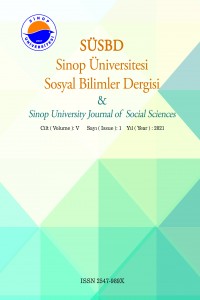Abstract
Jeopolitik; ülkelerarasındaki güç dengelerinin nasıl şekillendiğini inceleyen bir bilim dalıdır. Soğuk savaşın sonrasında, devletlerarasındaki güç dengesini askeri gücün şekillendirdiğini savunan görüş zayıflamaya başlamıştır. Devletlerarası güç dengesini, ekonomik gelişmişliklerine bağlayan jeoekonomi görüşü ortaya çıkmıştır. Jeoekonomi, jeopolitik amaçlara ulaşmak için ekonomik araçların kullanılması şeklinde tanımlanabilir. Bu görüşe göre, bir ülkenin ekonomik gücü arttıkça uluslararası ilişkiler arenasındaki güçleri de artmaktadır. Çalışmanın amacı; Türkiye’nin jeoekonomik gücünün belirlenmesidir. Bunun için; Türkiye’nin ekonomik bağımlılığının ölçüsü ve yönü tespit edilmiştir. Ekonomik bağımlılığın belirlenmesinde, dış ticaret ve doğrudan yabancı yatırım verileri kullanılmıştır. Analiz Türkiye’nin en yüksek ihracat ve ithalat gerçekleştirdiği 25 ülke özelinde gerçekleştirilmiştir. Bu ülkelere ilişkin “Ticaret hassasiyeti (Sensitivity of trade-ST), Ticaret kırılganlığı (Vulne-rability of trade-VT) ve Yatırım hassasiyeti (Sensitivity of investment-SI), Yatırım kırılganlığı (Vulnerability of invesment-VI)” değerleri hesaplanmıştır. Hesaplamalar sonucunda bulunan değerler, entropi yöntemi ile ağırlıklandırılmış ve “Ekonomik bağımlılık (Economic dependence-ED)” değeri elde edilmiştir.
Keywords
Jeoekonomi Ekonomik bağımlılık Ekonomik entegrasyon Doğrudan yabancı yatırım Ulslarası ticaret
References
- Barton, J. R. (1999). Flags of convenience: geoeconomics and regulatory minimisation. Tijdschrift Voor Economische en Sociale Geografie, 90, 142-155.
- Baru, S. (2011). Geo-economics and strategy. Survival, 54 (3), 47-58.
- Beeson, M. (2018). Geoeconomics with Chinese characteristics: The BRI and China’s evolving grand strategy. Economic And Political Studies, 6 (3), 240-256.
- Budak, T. (2013). Orta Asya’da küresel jeoekonomik rekabet ve Türkiye. Bilge Strateji, 5 (9), 125-142.
- Cowen D., & Smith N. (2009). After geopolitics? from the geopolitical social to geoeconomics. Antipode, 41 (1), 22-48.
- Csurgai, G. (2018). The ıncreasing ımportance of geoeconomics in power rivalries in the twenty-first century. Geopolitics, 23 (1), 38-46.
- Dal, A. (2020). Jeoekonominin yükselişi: Enerji kaynakları bağlamında Arktika ve Doğu Akdeniz bölgelerinin analizi. Dumlupınar Üniversitesi Sosyal Bilimler Dergisi, 65, 66-84.
- Erkişi, K. (2017). İktisadi gücün stratejik kullanımı: Jeoekonomi. Uluslararası Sosyal Araştırmalar Dergisi, 10 (52), 1025-1035.
- İnan, Ş. (2008). Jeoekonomi ve Türkiye'nin jeoekonomisi. Yayınlanmamış doktora tezi, Malatya: İnönü Üniversitesi Sosyal Bilimler Enstitüsü.
- İnan, Ş. (2011). Dünyada ve Türkiye'de jeoekonomi çalışmaları ve jeoekonomi öğretimi. Bilgi Strateji, 3 (4), 83-122.
- İnan, Ş., & Biber, S. G. (2020). Ulusal ekonomik gücün ölçülmesi: jeoekonomik güç endeksi. Avrasya Etüdleri, 57 (1), 55-88.
- Jaeger, B. C., & Brites, P. V. (2020). Geoeconomics in the light of ınternational political economy: A theoretical discussion. Brazilian Journal of Political Economy, 40 (1), 22-36.
- Karaatlı, M. (2016). Entropi-gri ilişkisel analiz yöntemleri ile bütünleşik bir yaklaşım: turizm sektöründe uygulama. Süleyman Demirel Üniversitesi İktisadi ve İdari Bilimler Fakültesi Dergisi, 21 (1), 63-77.
- Keohane, R. O., & Jr., J. S. (2011). Power and ındependence. London: Longman.
- Kundnani, H. (2011). Germany as a geo-economic power. The Washington Quarterly, 34 (3), 31-45.
- Liang, Y., Chen, M., Lu, D., Ding, Z., & Zheng, Z. (2019). The spatial evolution of geoeconomic pattern among China and neighboring countries since the reform and opening-up. Sustainability, 11 (7), 1-17.
- Luttwak, E. N. (1990). From geopolitics to geo-economics: Logic of conflict, grammar of commerce. The National Interest, 20 (1), 17-24.
- Mignolo, W. (2002). The geopolitics of knowledge and the colonial difference. The South Atlantic Quarterly, 101 (1), 57-96.
- Moisio, S. (2019). Re-thinking geoeconomics: towards a political geography of economic geographies. Geography Compass, 13 (10), 1-13.
- Ömürbek, N., Eren, H., & Dağ, O. (2017). Entropi-aras ve entropii-moosra yöntemleri ile yaşam kalitesi açısından AB ülkelerinin değerlendirilmesi. Ömer Halisdemir Üniversitesi İktisadi ve İdari Bilimler Fakültesi Dergisi, 10 (2), 29-48.
- Sparke, M. (2000). Excavating the future in cascadia: geoeconomics and the ımagined geographies of a cross-border region. BC Studies, 127, 5-44.
- Stergiou, D. (2015). Geo-economics through state scale entities (SSES). SSRN Electronic Journal, http://economics.soc.uoc.gr/macro/docs/Year/2015/papers/paper_1_64.pdf., 04 Nisan 2021.
- Wigell, M., & Vihma, A. (2016). Geopolitics versus geoeconomics: the case of Russia’s geostrategy and ıts effects on the EU. International Affairs, 92 (3), 605-627.
Details
| Primary Language | Turkish |
|---|---|
| Journal Section | Research Article |
| Authors | |
| Publication Date | June 30, 2021 |
| Submission Date | March 30, 2021 |
| Published in Issue | Year 2021 Volume: 5 Issue: 1 |

